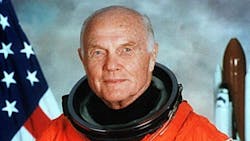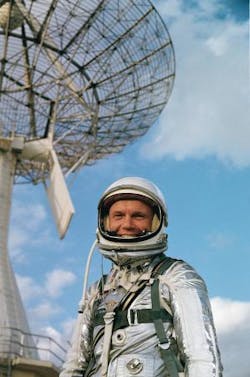What makes a hero? Is it climbing atop a missile to be lofted into orbit? Is it distinguished combat flying? Working diligently in elective office? Is it undying loyalty to one’s family?
John Herschel Glenn, Jr., qualified on all fronts.
This small-town Midwesterner, a fighter pilot in two wars, the first American to orbit the Earth, a senator for 24 years and a candidate for U.S. president, died Dec. 8 at age 95. He was the last surviving member of the “original seven,” the first cadre of American astronauts.
Glenn was also the oldest person to ever fly in space. At age 77, while serving in the Senate and leading a committee on aging, he lobbied for a position on a space shuttle crew. He said the physiological data that could be had with him as a guinea pig would advance scientists’ understanding of aging. While some saw it as a stunt, NASA could not deny a national hero. And on Oct. 29, 1998, after a 36-year hiatus, Glenn returned to space aboard the Discovery.
Born in 1921, Glenn’s childhood in New Concord, Ohio, was Norman Rockwell perfect. He even married his childhood sweetheart, Anna Margaret Castor. He became a Marine Corps aviator, flying 59 combat missions in World War II and 63 in the Korean War. After the wars, he went to test pilot school at the Navy’s Patuxent River, Maryland, center. In 1957, he set a speed record in an F8U Crusader—3 hr., 23 min. from Los Angeles to New York—the first transcontinental flight to average supersonic speed.
In 1959, he was selected along with six others to be America’s first astronauts. A freckle-faced all-American boy (though he was the oldest of the bunch), Glenn was something of a self-promoter. He campaigned hard within NASA to be the first of the group to fly in a Mercury spacecraft. Alan Shepard, Jr., and Virgil “Gus” Grissom preceded him, flying 15-min. suborbital missions. But Glenn was selected to fly around the planet first.
Americans were desperately trying to catch up with the Soviets in space. Sputnik was the first satellite. Yuri Gagarin had become the first person in space, orbiting the planet once. And Gherman Titov followed.
With Americans’ hopes high, Glenn’s flight in Friendship 7 looked like it might make things worse. First, navigation controls on the Mercury capsule failed. Glenn took over manually. Then, a sensor indicated the ablative heat shield at the aft end of the vehicle might be slipping off. If it came off, the spacecraft would burn up as it reentered the atmosphere. It turned out the sensor was faulty, but no one knew that at the time.
The planned seven-orbit mission was cut short at three, but America’s first man in orbit safely returned to Earth. NASA’s achievement, Glenn’s coolness and cheerful response to having survived prompted national celebration. Instantly, he was an American hero—ticker-tape parades and meetings at the White House. But for both, he insisted his six Mercury colleagues join him.
Like any pilot, Glenn wanted to fly again. What he did not know was that because he had become an icon the U.S. president, John F. Kennedy, did not want to risk losing him on another dangerous spaceflight. The president’s brother Robert F. Kennedy encouraged Glenn to run for public office. He did, in 1964, but a serious fall in a bathtub upset his plans and he withdrew. Eventually, he became an executive at a cola company.
Throughout it all—the nail-biting flying experiences, intense glare of publicity, triumphs and disappointments—John and Annie were the gravitational centers of their respective orbits. But Annie had a profound stutter. Glenn shielded her from the spotlight. In 1973, the couple learned of an intensive treatment program for stutterers. It worked for Annie, and returning home, she was able to tell America’s hero astronaut clearly for the first time, “John, I’ve wanted to tell you this for years: Pick up your socks.”
In 1974, Glenn made another run for the Senate. This time, he was elected. Ten years later, he tried to parlay his Senate experience and astronaut fame into a presidential nomination. His muddled sales pitch about being a reasonable moderate fell flat, however. Walter Mondale ended up winning the Democratic nomination only to be trounced in the general election by Republican Ronald Reagan.
Back on Capitol Hill, Glenn resumed as a legislative workhorse. Senators thought he was astute on military and intelligence matters. And he always seemed like a straight-shooter. An intern who shadowed him for a day wanted to get his autograph on Tom Wolfe’s The Right Stuff for her dad. She knew the book did not portray her boss in the most favorable light. Finally, screwing up her courage, she apologized but asked Glenn to sign the book. With a self-awareness rare among men, Glenn said, “That’s OK. I was an a**hole back then.”
They say no man is a hero to his valet. John Glenn might have been. Except he would never have had a valet.
This content originally appeared on AviationWeek. AviationWeek, like IndustryWeek is powered by Penton, an information services company.

